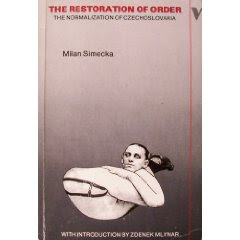Showing posts with label Czechoslovakia. Show all posts
Showing posts with label Czechoslovakia. Show all posts
Sunday, July 12, 2009
Great primer on the overthrow of Czech communism
Here's a great primer on what it used to be like under communism in Czechoslovakia from the BBC. Thanks to Prague expat JHuitz for sharing it. Click on my title to access the article and the section that goes with it.
Labels:
communism,
Czechoslovakia,
politics,
Prague
Tuesday, June 23, 2009
"The Restoration of Order" has begun in Iran
 My English-language church in Prague, St. Clements Church on Klimentska, held this incredibly educational series of program on "what it was like to be a Czech Christian under communism." Wow, was that an eye-opening series of programs. Everyone who went was on the edge of their seats listening to our distinguished dissident speakers.
My English-language church in Prague, St. Clements Church on Klimentska, held this incredibly educational series of program on "what it was like to be a Czech Christian under communism." Wow, was that an eye-opening series of programs. Everyone who went was on the edge of their seats listening to our distinguished dissident speakers.Our last speaker in the series was an expert on Czech church history and I asked him if it was possible to create a list of "dos and don'ts to share with future congregations on how not to get co-opted by repressive regimes." There was a general chuckle at my naivete because this sort of thing is not preventable. Each generation has to learn for themselves. We've all heard the phrase "those who do not remember history are doomed to repeat it," right? Well at this session I learned the phrase, "what we learn from history is that we learn nothing from history."
Want some evidence of that (with apologies for sounding so dark, so Czech!)? This article, linked to in my blog post title, shows that the "restoration of order" has begun in Iran. Even the phrase that this young woman uses to describe the regime's actions is the same in English as it was back then in post-1968 Czechoslovakia.
What we learn from history is that we learn nothing from history.
Monday, June 15, 2009
Is it the Velvet Revolution or Normalization in Iran?
The bravery of Czechs in their Velvet Revolution and Ukrainians in their Orange Revolution has been referred to again and again in news coverage of the Green Tsunami (the reform slate) in the Iranian elections. Raman Ahmadi writes in Forbes comparing the current crisis to what's happened before in Czechoslovakian history. Below is an excerpt; you can click on my title to read the entire article.
There are at least two possible outcomes for the current crisis. If the Ahmadinejad's coup is successful, we will witness another post-1968 Prague spring, crushing the reform movement and including a military attempt at "normalizing" society. Mousavi will be forced to appear on television and play the role of an Iranian Dubcek, expressing regrets and calling on people to stop resisting the military regime.
If this coup fails, on the other hand, Tehran may experience the Prague spring of 1989, and the country will be wide open to the possibility of substantial reforms and liberalization, well beyond what was seen in the Khatami era. In either case, the Islamic Republic we have known for the last three decades is gone. That strange, fragile and contradictory 1979 newborn, a hybrid of clerical theocracy and Western-style republic, has long been dead. Some have argued it was a stillbirth. Others have insisted on its potential. Either way we evaluate the regime, it's clear today that only brutal military force can sustain the theocratic element.If you don't know what normalization is, there's a chilling book that describes the entire dehumanizing process. Normalization is so draconian that it seems it just makes the eventual political explosion that much bigger because no human being can live that way for long. The book is called "The Restoration of Order: The Normalization of Czechoslovakia" by Milan Simecka. You can read my review of it here.
So my dear Czech readers, do you have advice for the Iranian people how to make 1989 happen rather than 1968? And not to be pessimistic (or as Czechs would say: realistic) what advice do you have for them on surviving normalization, if 1968 happens?
Labels:
books,
Czechoslovakia,
Iran,
normalization,
politics,
Prague Spring,
Velvet Revolution
Tuesday, May 26, 2009
The Kundera Conundrum
 Here's an interesting article that appeared in "The Nation" about the accusations against Kundera that shows the tyranny of reputation-shredding works in all political systems from totalitarianism to capitalism.
Here's an interesting article that appeared in "The Nation" about the accusations against Kundera that shows the tyranny of reputation-shredding works in all political systems from totalitarianism to capitalism.I love what Kundera was quoted as saying about Bohumil Hrabel in this piece as well.
There's also a bit in here about Cerny's Entropa. Why is it only the Czechs seem to get Cerny's humor? I think Entropa is wonderful but it seems the rest of the world can't take a joke. Geez, lighten up.
The Kundera Conundrum
Labels:
books,
Czech culture,
Czech people,
Czechoslovakia,
David Cerny,
Entropa
Where Did Czech and Slovak people settle in America?
Click on my title to play with a way-cool immigration map that allows you to see where immigrants from a certain country settled in America over time. Just select 'Czechoslovakia' as the country of origin and then move the decade cursor to see where all the Czechs and Slovaks settled.
And what happened when the new immigrants arrived and there was no place familiar to worship? They had to build their own, often to home scale. This Slovak family shrine is on display in the Wisconsin Historical Museum. It was built by a new Slovak immigrant obviously missing the customs and faith he had known back home.
And what happened when the new immigrants arrived and there was no place familiar to worship? They had to build their own, often to home scale. This Slovak family shrine is on display in the Wisconsin Historical Museum. It was built by a new Slovak immigrant obviously missing the customs and faith he had known back home.
Labels:
American people,
Czech people,
Czechoslovakia
Wednesday, May 13, 2009
A Table for Tyrants
What is the antidote to cynicism? Action.
In this New York Times editorial, Vaclav Havel takes action by demanding that the human rights organizations dissidents in countries with poor human rights records would look to for help -- actually be able to help them from a position of moral authority and credibility. Click on the title to read his recent editorial.
In this New York Times editorial, Vaclav Havel takes action by demanding that the human rights organizations dissidents in countries with poor human rights records would look to for help -- actually be able to help them from a position of moral authority and credibility. Click on the title to read his recent editorial.
Labels:
Czechoslovakia,
politics,
Vaclav Havel
Friday, March 20, 2009
"The Restoration of Order: The Normalization of Czechoslovakia" by Milan Simecka
 People read George Orwell's "1984" to imagine the kind of inhuman state where individuals don't matter and the state's right to control all is paramount. Orwell's "1984" is fiction. Milan Simecka, a Czechoslovak dissident writing in the early 1980's explains for history what happened in Czechoslovakia following the people's attempt to "put a human face" on socialism.
People read George Orwell's "1984" to imagine the kind of inhuman state where individuals don't matter and the state's right to control all is paramount. Orwell's "1984" is fiction. Milan Simecka, a Czechoslovak dissident writing in the early 1980's explains for history what happened in Czechoslovakia following the people's attempt to "put a human face" on socialism.How was the totalitarian country able to reinstitute a Stalinist-style state without violence after the Prague Spring in 1968? How did the government eliminate dissent in less than two years? In chilling detail, Simecka shows how the State used it's power over people's income, jobs, friendships, even their children's future to control each citizen's every move.
Approximately 10-20% of the Czech population still votes for the Communist Party. My Czech friends tell me that the people still voting for the Communist party look back with nostalgia at getting a job from the state, getting a flat from the state, and cheap bread. With everything "provided" life had "no worries."
Today's young people, especially, may not know the horrors of that time, because the Czechs are so sick of that period there hasn't yet been a national curriculum developed to teach young people what happened. Czechs want to let it go and move on (hence, they think we Americans are obsessed with it all!)
I recommend this book for every reader of any country who wants to understand the communist totalitarian period. It would be a great book for any Czech/Slovak or political book club. I also think it would be especially useful for every Czech and Slovak high school student to understand the choices their parents and grandparents had to make to survive.
Like "The Diary of Ann Frank," which most American kids read sometime during their education, this book makes the choices presented by the times very personal and imaginable.
You may be interested in another book about governmental abuse of power:
Understanding Iran: The Power of One Graphic Novel called 'Persepolis'
Labels:
books,
communism,
Czech Republic,
Czechoslovakia,
high school,
normalization,
politics,
Prague Spring,
samizdat
Subscribe to:
Posts (Atom)













 Who links to me?
Who links to me?
